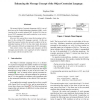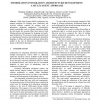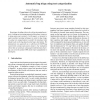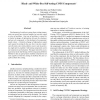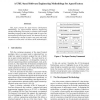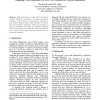SEKE
2004
Springer
14 years 6 months ago
2004
Springer
The textual Object Constraint Language (OCL) is an official part of the Unified Modeling Language (UML). A new concept in the recently adopted OCL version 2.0 is the notion of O...
SEKE
2004
Springer
14 years 6 months ago
2004
Springer
Multi-Agent Systems (MAS) architectures are gaining popularity for building open, distributed, and evolving software required by systems such as information integration application...
SEKE
2004
Springer
14 years 6 months ago
2004
Springer
Bug triage, deciding what to do with an incoming bug report, is taking up increasing amount of developer resources in large open-source projects. In this paper, we propose to appl...
SEKE
2004
Springer
14 years 6 months ago
2004
Springer
In this paper we present an alternative to the VISITOR pattern, DYNAMIC DISPATCHER, that can be applied to extend existing software in a nonintrusive way, and which simulates cova...
SEKE
2004
Springer
14 years 6 months ago
2004
Springer
In this work, we present an application of the Fuzzy Logic in the field of prediction in Software Engineering. We specifically use the Fuzzy Prototypical Knowledge Discovery for ch...
SEKE
2004
Springer
14 years 6 months ago
2004
Springer
This paper describes the software infrastructure introduced within the AgentService framework in order to provide support for ontology design, development, and management. Ontolog...
SEKE
2004
Springer
14 years 6 months ago
2004
Springer
Development of a software system from existing components can surely have various benefits, but can also entail a series of problems. One type of problems is caused by a limited ...
SEKE
2004
Springer
14 years 6 months ago
2004
Springer
This paper presents the Agent Factory Development Methodology, an Agent-Oriented Software Engineering (AOSE) methodology that employs a synthesis of the Unified Modelling Languag...
SEKE
2004
Springer
14 years 6 months ago
2004
Springer
Requirements prioritization plays a key role in the requirements engineering process, in particular with respect to critical tasks such as requirements negotiation and software re...
SEKE
2004
Springer
14 years 6 months ago
2004
Springer
UML statecharts are widely used to specify the dynamic behaviours of systems . To support systematic simulation of such models, we propose an approach to map systems specified usin...
